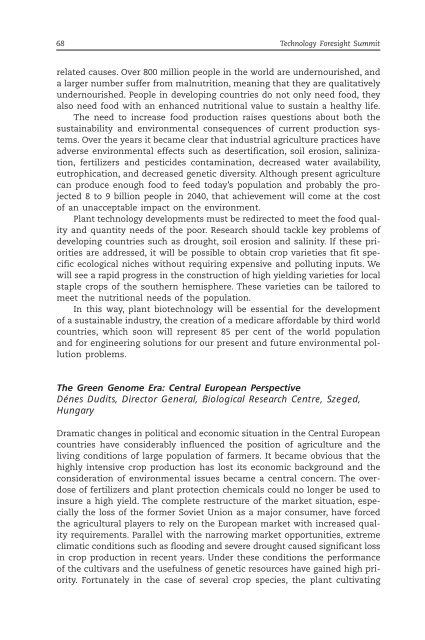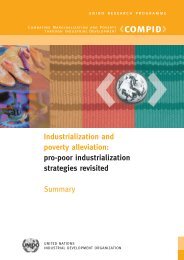TECHNOLOGY FORESIGHT SUMMIT - Unido
TECHNOLOGY FORESIGHT SUMMIT - Unido
TECHNOLOGY FORESIGHT SUMMIT - Unido
You also want an ePaper? Increase the reach of your titles
YUMPU automatically turns print PDFs into web optimized ePapers that Google loves.
68 Technology Foresight Summit<br />
related causes. Over 800 million people in the world are undernourished, and<br />
a larger number suffer from malnutrition, meaning that they are qualitatively<br />
undernourished. People in developing countries do not only need food, they<br />
also need food with an enhanced nutritional value to sustain a healthy life.<br />
The need to increase food production raises questions about both the<br />
sustainability and environmental consequences of current production systems.<br />
Over the years it became clear that industrial agriculture practices have<br />
adverse environmental effects such as desertification, soil erosion, salinization,<br />
fertilizers and pesticides contamination, decreased water availability,<br />
eutrophication, and decreased genetic diversity. Although present agriculture<br />
can produce enough food to feed today’s population and probably the projected<br />
8 to 9 billion people in 2040, that achievement will come at the cost<br />
of an unacceptable impact on the environment.<br />
Plant technology developments must be redirected to meet the food quality<br />
and quantity needs of the poor. Research should tackle key problems of<br />
developing countries such as drought, soil erosion and salinity. If these priorities<br />
are addressed, it will be possible to obtain crop varieties that fit specific<br />
ecological niches without requiring expensive and polluting inputs. We<br />
will see a rapid progress in the construction of high yielding varieties for local<br />
staple crops of the southern hemisphere. These varieties can be tailored to<br />
meet the nutritional needs of the population.<br />
In this way, plant biotechnology will be essential for the development<br />
of a sustainable industry, the creation of a medicare affordable by third world<br />
countries, which soon will represent 85 per cent of the world population<br />
and for engineering solutions for our present and future environmental pollution<br />
problems.<br />
The Green Genome Era: Central European Perspective<br />
Dénes Dudits, Director General, Biological Research Centre, Szeged,<br />
Hungary<br />
Dramatic changes in political and economic situation in the Central European<br />
countries have considerably influenced the position of agriculture and the<br />
living conditions of large population of farmers. It became obvious that the<br />
highly intensive crop production has lost its economic background and the<br />
consideration of environmental issues became a central concern. The overdose<br />
of fertilizers and plant protection chemicals could no longer be used to<br />
insure a high yield. The complete restructure of the market situation, especially<br />
the loss of the former Soviet Union as a major consumer, have forced<br />
the agricultural players to rely on the European market with increased quality<br />
requirements. Parallel with the narrowing market opportunities, extreme<br />
climatic conditions such as flooding and severe drought caused significant loss<br />
in crop production in recent years. Under these conditions the performance<br />
of the cultivars and the usefulness of genetic resources have gained high priority.<br />
Fortunately in the case of several crop species, the plant cultivating

















